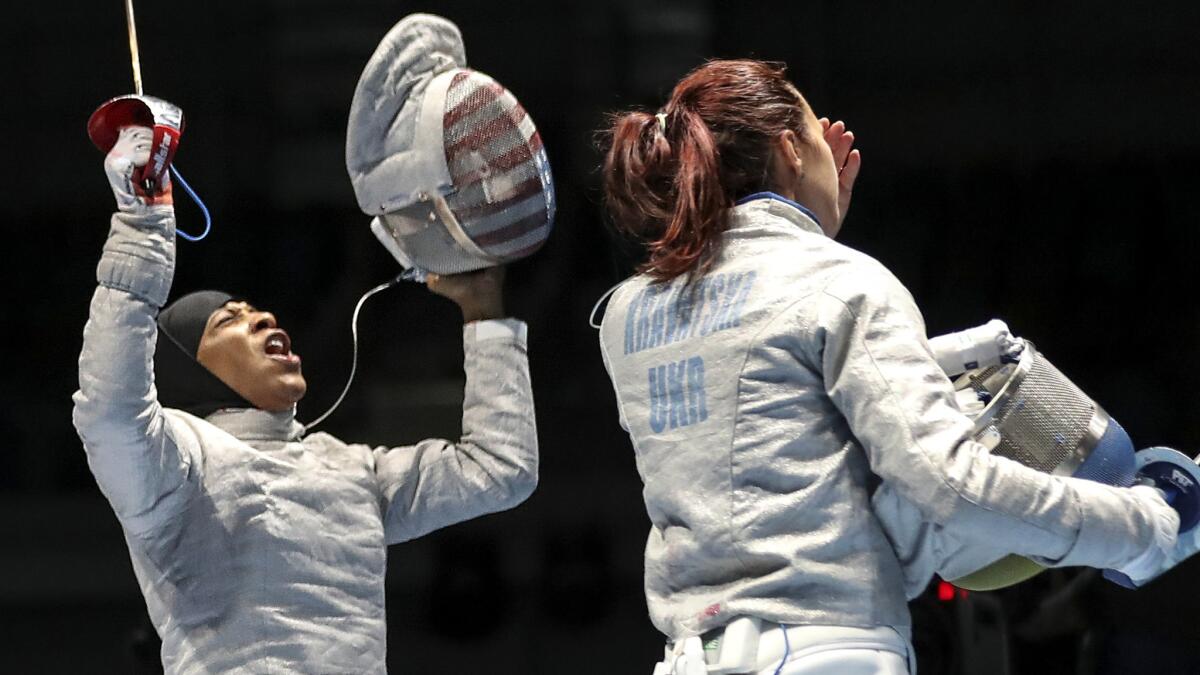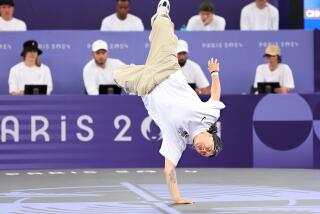Ibtihaj Muhammad finds the moment she created will overshadow disappointment of a loss

- Share via
Reporting from Rio de Janeiro — The bout ended with Ibtihaj Muhammad tumbling backward, driven off the fencing strip by her opponent, driven straight out of the women’s saber competition.
It was not the result she had hoped for, but the 30-year-old New Jersey native wasn’t going to let it overshadow her groundbreaking day at the 2016 Summer Olympics.
“I wouldn’t say I felt down and out,” she said. “I realize this moment is bigger than me.”
By stepping to the en garde line at Carioca Arena 3 on Monday morning, Muhammad became the first American to compete at the Games in a hijab, the headscarf traditionally worn by some Muslim women.
Her religion had made headlines and she had patiently faced the media in recent months, answering every question, determined to serve as an example at a time when Islam is so controversial in U.S. politics and the news.
“I don’t feel like any part of this journey of mine has been a burden,” she said. “I feel like it has been a blessing to represent so many people who don’t have voices.”
There was, however, a tinge of frustration in her words regarding her round-of-16 loss to Cecilia Berder of France, who scored the final point with an aggressive attack that put Muhammad on the floor.
“I wish that I would have performed better,” Muhammad said.
The day began on a better note against Olena Kravatska of Ukraine. In a bout that stayed close until the end, Muhammad scored the final two points.
In the stands, her brother Qareeb was screaming himself hoarse. He had spent the previous day with his sister at the athlete’s village.
“She was just soaking in the moment,” he said. “She was more than excited.”
Her father, a retired narcotics detective, acknowledged that watching his daughter venture into the public spotlight had not been easy. Eugene Shamsiddin Muhammad said: “In this society in which we live, you have to worry.”
Ibtihaj had never been the type to shy away from sharing her opinion, family and friends say, and she wasn’t going to waste an opportunity to show that religion does not entirely define a person.
“How can you not see that Muslims are like any other group?” she asked.“We are conservatives and liberals. There are women who cover and women who don’t. There are African-American Muslims, white Muslims and Arab Muslims.”
In her midday match against Berder, Muhammad built a 6-2 lead but gradually succumbed to nerves and a noisy crowd. The Frenchwoman showed more poise in reeling off a string of touches to take the lead at the end of the first period.
The gap widened after that as Muhammad argued with the referee and, at one point, drew a yellow-card warning for throwing her mask to the floor. Berder won, 15-12.
“If you can control yourself and your nerves and your emotions, and execute the actions that you want, you’ll always be successful,” Muhammad said. “I failed to do that today.”
The entire U.S. contingent had a rough go with Dagmara Wozniak losing to Vassiliki Vougiouka of Greece in the second round and two-time gold medalist Mariel Zagunis falling to underdog Ekaterina Dyachenko of Russia in the third.
“I didn’t get off to the start that I wanted to, as far as sticking to my game plan,” Zagunis said. “I just kept making a lot of mistakes.”
The disappointment was evident as she, and then Muhammad, strode past reporters without comment. They returned nearly an hour later.
At that point, they talked about using the losses as fuel for the upcoming team competition.
“I think we’re all going to be really fired up,” Zagunis said.
Muhammad could take solace in a larger purpose.
During the lead-up to the Games, she challenged conceptions outside the Muslim community and within, encouraging girls in her religion to play sports.
“Anyone who has paid attention to the news at all would realize the importance of having Muslim women on Team USA,” she said. “It’s in light of what’s going on in our country, the political fuss we hear about.”
The interview session ended with a question about Donald Trump and a joke about Muhammad running for president. On this day, fencing was only part of the story.
Twitter: @LATimesWharton
More to Read
Go beyond the scoreboard
Get the latest on L.A.'s teams in the daily Sports Report newsletter.
You may occasionally receive promotional content from the Los Angeles Times.







